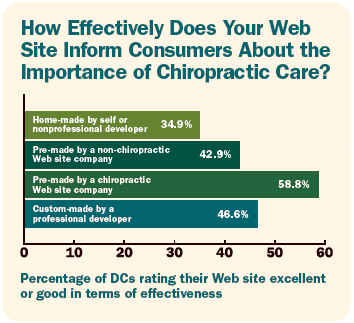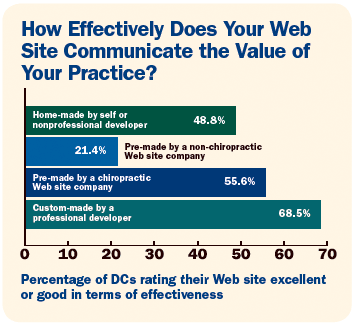The Internet has replaced much that was commonplace in our society. Phone books, maps, travel agents, etc. are almost things of the past. Starting in elementary school, today's students have learned to find it (and buy it) online.
Even so, only 62 percent of DCs reported in a recent survey that they have Web sites for their chiropractic practice.1 More than 50 percent of those who don't have a practice Web site either thought they were too expensive (26 percent) or they "didn't see the benefit" (25 percent). According to Dr. Alicia Farrell, a doctor who took the survey, the benefits are easy to define: "Established patient communication and attraction of new patients."
Purpose, Creation and Cost
There are several reasons to have a chiropractic practice Web site. When asked, almost half of DCs (44 percent) stated that the primary purpose of their Web site was "making people aware of my practice." As Dr. Ronn Radcliff puts it: "Most consumers search the internet looking for a service or product. If you're not on-line, you don't exist."
Almost a third (29 percent) of doctors stated that "attracting new patients" was the primary purpose of their Web site. "Communicating with my existing patients" and "informing consumers about chiropractic care" were chosen by 10 percent and 9 percent of DCs respectively.
When asked who created their Web site, 21 percent of doctors created it themselves or had a non-professional create it for them. Twenty-eight percent of doctors chose custom Web sites created by a professional developer. When it came to generally non-custom or pre-made Web sites, only 7 percent of DCs chose a site created by a non-chiropractic company, while 44 percent chose one created by a company that specializes in chiropractic Web sites. Who created the chiropractic practice Web site does make a difference when it comes to informing the community, attracting new patients and communicating with existing patients:


While "homemade" Web sites are probably cheaper, they fall behind in communicating with patients, informing consumers about chiropractic and presenting the value of the doctor's practice. Web sites by non-chiropractic companies are remarkably poor at attracting new patients and behind in the other three categories.
The two most effective choices are pre-made by a chiropractic company and custom made by a professional. These are both superior at communicating with existing patients and attracting new patients with custom sites taking a slight edge. Chiropractic company Web sites are better at communicating the value of chiropractic, while custom Web sites are more effective at communicating the value of the practice.
Web Site Performance
Attracting new patients is an important aspect of having a Web site. While some doctors don't believe that Web sites generate new patients, they are not in the majority. Only 14 percent of DCs stated that they "almost never" gain a new patient from their Web site. Another 23 percent stated that the number of new patients from their Web site was "less than one per month." One-third of doctors gain one to two new patients per month from their Web site. Another 20 percent enjoy three to four new patients per month, with 6 percent receiving five to nine new patients per month and 3 percent with 10 or more new patients coming from their Web site each month.




